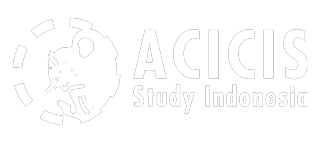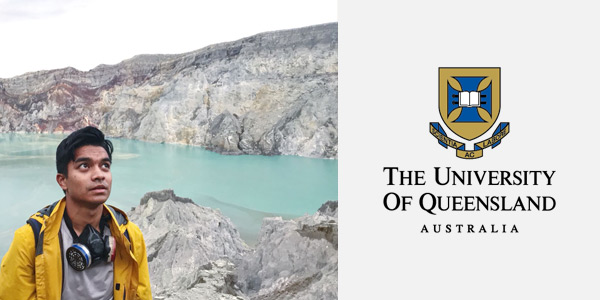Farzan Saif is a participant in the 2018 Development Studies Professional Practicum from the University of Queensland. Farzan is studying a Bachelor of Arts/Laws. Farzan received a $3,000 New Colombo Plan mobility grant to support his participation on this program.
Q: Why did you decide to undertake the ACICIS program?
I applied for the DSPP program, as it was a once off experience that could kill at least 3 birds with one stone. It was an opportunity to gain working experience over the summer in the international development sector. It was an opportunity to challenge myself, by immersing myself in an environment where my usual creature comforts of Australia were nowhere to be found.
Most importantly it was an opportunity to meet a plethora of new people. The Australian ACICIS students that I shared many moments with, and that held many of the same ambitions as myself, will undoubtedly remain lifelong friends. On the other hand, being able to meet Indonesian locals and hear their stories was one of the most rewarding experiences I’ve had. Stepping outside of the university bubble that I live in, and into one where people have extremely different day to day experiences allowed me to really put my own Australian upper-middle class life into perspective.
Q: How will the Professional Practicum benefit or influence your future career? Would you like to return to Indonesia again in future?
The Practicum will benefit my future career in multiple ways. Firstly, the work experience sets me apart from other students, as not many students graduate with overseas working experience. Particularly with the DSPP, it’s a way to get my foot in the door in the development sector, which can otherwise be quite difficult, particularly for undergraduates. Secondly, the connections that I have made both within my host organisation and with ACICIS affiliated students/staff I will strive to keep throughout my professional life. Finally, it’s made me much more open and willing to work in foreign countries, something I may have previously written off due to fear of living in unknown environments.
Q: What organisation will did you intern with? (Explain your roles and responsibilities)
I was an intern with an international NGO named IDH Sustainable Trade Initiative. My role was mainly focusing on economic research and analysis on sustainable commodities being produced in West Kalimantan. As part of my internship I spent two weeks at the head office of IDH in Jakarta, and two weeks on the field with an implementing partner, SAMPAN Kalimantan, in Borneo.
Q: How have you found the work culture of your host organisation? How is it different to work experience in Australia?
Working at IDH was a somewhat similar work culture to Australia. The largest difference in my work experience was what I experienced while working with the implementing partner SAMPAN. This was quite a grassroots organisation, and as such, had a very young team who had a much more relaxed and casual working environment. In both organisations I found that one difference was that people rarely stayed put in one office, and were constantly moving around between offices, whether it be IDH staff visiting operations in other provinces, or SAMPAN workers going back and forth between the village areas, sometimes staying for multiple days during the week.
Q: What do you like to do in your spare time in Indonesia?
Explore the natural beauty of Indonesia. Indonesia has some of the most gorgeous volcanic lakes in the world (particularly Ijen, Rinjani and Kelimutu) that remind you of the mind boggling diversity of Indonesia. Ethe islands, particularly snorkeling at the many beaches of Indonesia is an experience that I will not forget. Otherwise, just exploring the depths of Jakarta with friends, a city with every subculture in existence, provides endless entertainment.
Q: Would you like to return to work in Indonesia again in the future?
If I could have the opportunity to work in Indonesia again I would take it in a heartbeat. There are so many aspects of Indonesian language, culture, history and geography that I previously knew nothing about, but am now thoroughly obsessed with.
Q: Favourite place to eat? Favourite Indonesian food?
Hands down favourite place to eat was Ibu Susi’s Warung directly across the road from where my accommodation in Jakarta was. The people you talk to at warungs are always half the fun! Ibu Susi began to recognise me, and as my Indonesian skills grew so did our ability to have conversations. The two foods that I fell in love with were definitely Tempe and Sambal.
Q: Favourite Indonesian word/phrase?
A tough call. ‘Cincin cincin’ (rings) is so much fun to say, but practically doesn’t get nearly as much usage as it should. I think the one word that has stuck with me all the way back to Australia would be the infamous ‘bule’ (foreigner, or white foreigner rather).
Q: What places in Indonesia have you visited during your practicum so far?
West Kalimantan, Thousand Islands, Bogor, Puncak, Jogjakarta, Bromo, Ijen, Lombok. It’s amazing the amount you can do in 6 weeks, while working full time!


